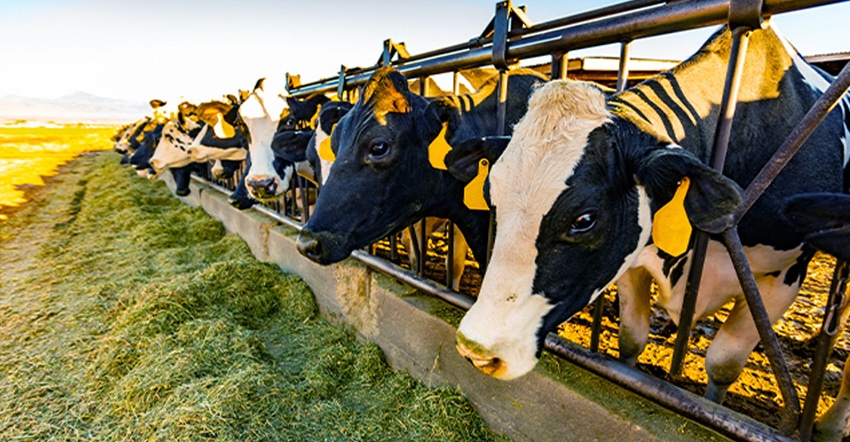The heat takes a toll on dairy cows, reducing feed intake and overall performance. Prepare your herd for the heat with a balanced diet.

Sponsored Content
With summer quickly approaching and some parts of the country already seeing high temperatures, now is the time to mitigate the effects heat will have on your dairy herd. Feed intake and rumination often decrease with rising temperatures, hampering milk production and reproductive performance. So, how do you protect your herd against the heat? By preparing them.
Just like your cooling equipment needs a tune-up for the coming months, so does your nutrition strategy. Ensuring your ration is properly formulated can reduce strain placed on cows from warm weather. Not to mention a balanced diet can improve digestion and reproductive performance in the face of heat stress.
Boost potassium to beat heat stress
Potassium deficiencies are synonymous with heat stress. While milk is known for high levels of calcium, potassium levels are higher. Potassium is the main component of sweat and cows lose it quickly through increased perspiration and urination during hot weather.
Fresh cows also require higher levels of dietary potassium, and research shows that cows are often potassium deficient for the first 10 weeks of lactation. That's why it's important to feed supplemental potassium. Achieving a positive DCAD (Dietary Cation-Anion Difference) level and increasing the potassium component can help replace what is lost during milk production.
Increasing feed grade potassium carbonate to 1.7 to 2 percent in high-producing and fresh cow diets helps maximize production and improve cow starts during heat stress. Potassium sources like DCAD Plus™ can help achieve optimal levels of potassium.
Stabilize the rumen with a buffer
Reduced feed intake due to heat stress leads to less rumination and, therefore, less saliva. This makes cows much more susceptible to subclinical and acute rumen acidosis. Buffers help stabilize rumen acids, increasing feed intake and improving rumen performance.
While cows need this assistance throughout the entire year, it's especially important in hot weather. Many diets now include more fermentable carbohydrates, which requires more buffering.
Fight the heat with yeast
Research shows that feeding yeast components improves daily milk yield by 2.6 pounds per cow during heat-stressed conditions, making yeast the final component to balancing diets for heat stress.
A-MAX™ is a source of yeast that supports optimal fermentation and digestion during high temperatures. You should consult your nutritional advisor for specific feeding recommendations, as levels may vary based on herd stressors.
Get ahead of heat stress
Now is the time to formulate rations to help your herd overcome stress from hot weather. Get ahead of the high temperatures to improve cow resiliency before heat stress strikes.
To learn more on how you can minimize the effects of heat stress, check out this heat stress checklist.
© 2020 Church & Dwight Co., Inc. ARM & HAMMER and its logo, A-MAX and DCAD Plus are trademarks of 2020 Church & Dwight Co., Inc.
About the Author(s)
You May Also Like

.png?width=300&auto=webp&quality=80&disable=upscale)

